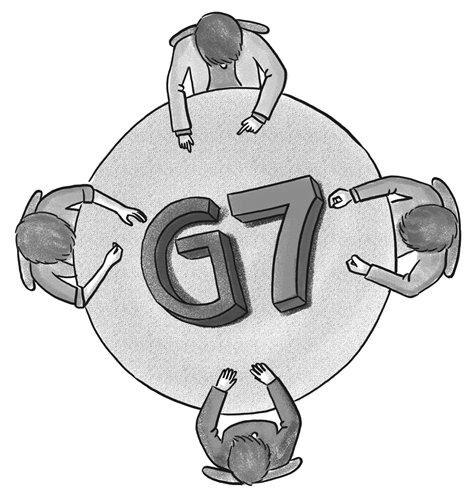HOME >> BUSINESS
G7 should follow through with African aid promises
By Sun Haichao Source:Global Times Published: 2019/9/1 19:33:41

Illustration: Xia Qing/GT
Very few people held an optimistic attitude about this year's G7 Summit except French President Emmanuel Macron, who attached an air of importance to it. Reasonably, it offers a stage for France to play a major role in the international community. To showcase France's global influence, Macron has set his sights on Africa.
National leaders from five African countries including South Africa, Egypt, Burkina Faso, Rwanda, and Senegal, along with leaders from the African Union and African Development Bank were invited to the G7 Summit. Also included on the invitation list were the heads of important international political and financial institutions like the United Nations, World Bank, IMF and the Organisation for Economic Co-operation and Development (OECD).
Last year, Macron proposed the major topics for the G7 should cover the elimination of inequality and African assistance to boost its development and address safety concerns. However, a joint statement was not issued at the end of this year's summit.
This was an indication that no matter what kind of promises were made to Africa, they will not bring substantial benefits.
Since the government of former president Charles de Gaulle in the 1960s, Europe and Africa have been two strategic pillars and driving forces for France to emerge as a significant power, and both are indispensable. Developed countries must shoulder the responsibility of helping developing countries, but such advocacy is only acknowledged verbally.
Nearly two decades have passed since the announcement of the Millennium Development Goals, which were designed by the UN to help Africa. Nonetheless, the promises that have been made by developed countries have been far removed from reality.
There still exists economic, political, financial, and military control over the former colonies. Many African countries have had to rely on financial aid and peacekeeping troops to develop their economy and ensure security.
At present, developed countries want to reinforce the presence of the G7, whose influence has declined, so they highlight the objective of "promoting African interests."
However, people will not forget that some African countries became victim to the "Arab Spring," a series of revolts in the Middle East initiated by the West.
If Western developed countries like the US and European nations sincerely want to assist Africa, such actions will be welcomed by all countries, including China. But if they only want to revive their strategic influence and status in Africa, they are unlikely to reach this goal. There are two reasons that support this view.
First, the idea of deeming Africa as a sphere of influence has bored the continent. On the one hand, Western developed countries emphasize the significance of Africa in geo strategies; on the other hand, they only shout slogans instead of putting them into practice when it comes to providing aid.
As the most influential Western country for Africa, France has long considered it a traditional sphere of influence. As a result, France retains the "natural vigilance and hostility" toward other countries' involvement in African affairs.
One case is that the US Africa Command is still located in Germany and not Africa due to the objection and disagreement from France. Nevertheless, French aid to Africa has failed to satisfy many African nations.
Second, after several decades' exploration, Africa has strengthened its independent thinking. Some of the ideas and lessons are obtained through Africa's first-hand experience. African countries are forming their own judgments about what is good for self-betterment and what is more feasible and convincing than Western "strategies."
For several consecutive years, China has been Africa's largest trade partner and foreign investor. Based on observations in Africa, drastic changes have taken place in many African countries, thanks to China-Africa cooperation.
Moreover, as the largest developing country in the world, China is the most suitable partner to provide Africa with development experience. The continent's advance is an opportunity for the world, which shouldn't be a zero-sum game between China and the West. Today, it is necessary to respect the choices and will of Africa. Promoting African interests should be both the criterion and the target.
The author is the director of the European Center at China Foundation for International Studies. bizopinion@globaltimes.com.cn
Posted in: INSIDER'S EYE